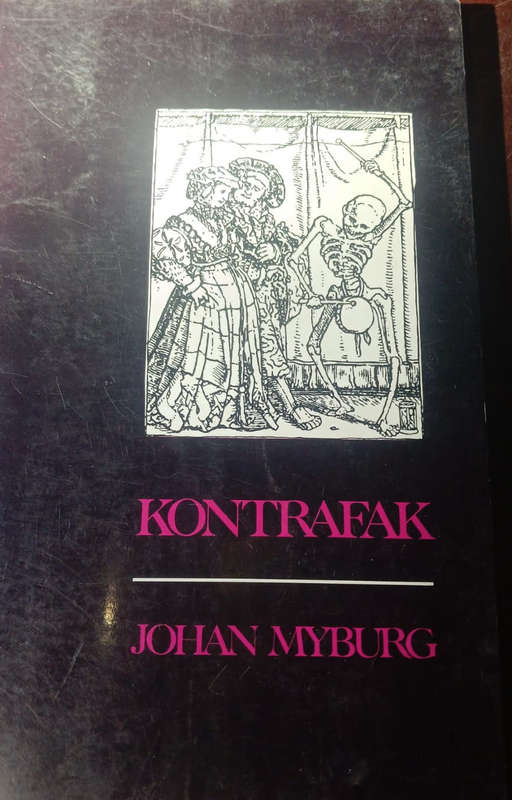
Kontrafak - Johan Myburg (signed)
Check my rate
| Main centres: | 1-3 business days |
| Regional areas: | 3-4 business days |
| Remote areas: | 3-5 business days |

| Main centres: | 1-3 business days |
| Regional areas: | 3-4 business days |
| Remote areas: | 3-5 business days |
Inscribed & dated by the poet, first edition, Human & Rousseau, 1994, softcover, Afrikaans text, 71 pages, previous owner's name & date to first page, otherwise condition: very good,
" Kontrafak " comes from the Middle Ages, according to which people used the words of secular songs for sacred melodies, while it can also indicate a print or imitation. It postulates a religious worldview that determines the vision of the verses. Musical references are the most important link between the books six sections. The tension between the secular and the spiritual, the world and the church and the here and the hereafter is present throughout the volume. Themes that are tackled are the political, social and spiritual realities, which are mostly discussed with clear disillusionment. Contrasted with this is the description of beauty in the ordinary.
The volume is divided into six numbered sections. Section I contains poems about extraordinary phenomena, as in Apparition and Meditations II . In the second section, it is the vicar's or monk's experiences, with the profane being transposed to the spiritual, and vice versa. Pastor is an allusion to Psalm 23, where the spiritual shepherd is incapable of leading the flock to the waters of rest and instead wanders off to more worldly pursuits. Margin of a Monk is a poem about the origin of the first recorded piece of Dutch, a margin in the margin of a monk's transcription of the Latin Bible, with the words Hebban olla vogala nestas hagunnen, hinase hic enda thu (Have all the birds started building nests, except you and me). The poet depicts the monk here where, in violation of his commandments, he dreams of a double bed and a life with the beloved. The third section depicts voyages of discovery, with the realization that the greatest discoveries that man can make can now be found in the everyday (" Expedition "). Section " IV " is personal reflections, with " Review " a skilful response to a reviewer who, in his discussion of his first collection of poems " Vlugskrif " based his negative reaction to the collection on the fact that this collection was not involved in the political situation in the country. "Song of the bridegroom is a beautiful verse about love, which with African motifs and a subtle allusion to Marais' Dance of the rain sings a song of praise to his bride. The fifth section contains travel poems and accommodation impressions. " Morgen ben ik op de maan " based on a motto by Herman van Veen depicts an evening at home of a family man, who seems to go through the routine contentedly and happily, but secretly dreams of far away and adventurous places. The sixth section consists of the poem " Codicil " (an addition to a will) in which death is expected in the sure knowledge that life's endless error will pass.
The opening poem, Jongleur , connects to the collection's medieval origins with its account of the performer who traveled from town to town with his songs and tricks to entertain the people in the market square, while the last stanza is another medieval used call: that of the love song that the lover sang at night in front of the beloved's window. Here, however, it is the falsehood that looms large, for his songs are of infidelity and penance.
This collection of poems won the Eugène Marais prize in 1995.